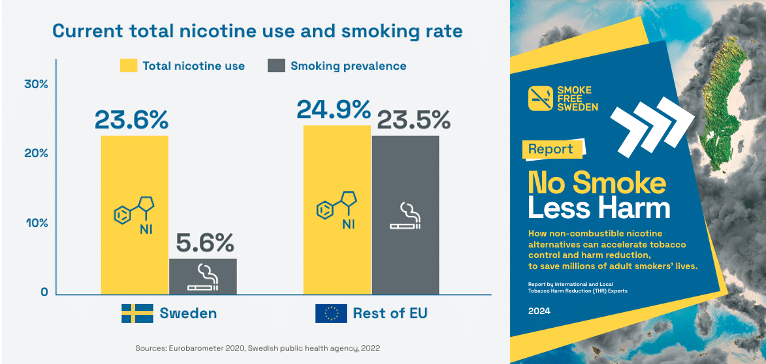
Three myths about nicotine pouches: what science says
The debate around nicotine pouches is heating up in both in the US and the EU, making it difficult to discern fact from fiction. Here are three common myths about snus and nicotine pouches along with details about what the science actually says.
1. Myth: Nicotine Pouches Are Not Tobacco-Free
Many claim incorrectly that nicotine pouches are not tobacco-free. Unlike traditional snus, nicotine pouches do not actually contain tobacco. They do, however, contain nicotine, which is extracted from the tobacco plant. Nicotine is classified as an alkaloid, like caffeine and morphine. While nicotine can be addictive, it does not cause cancer in the way combustible tobacco does.
Nicotine pouches are as free from tobacco as steel is free from iron ore. Anyone claiming otherwise is either poorly informed or trying to be intentionally misleading.
You can read all about nicotine here.
2. Myth: Snus and Nicotine Pouches Are a Gateway to Smoking
Several studies actually show the opposite: that snus and nicotine products are a gateway out of smoking. Research has demonstrated repeatedly that these smokeless nicotine products can be the best alternative for those who want to quit deadly cigarettes. For example, a 2022 Norwegian study concludes that snus significantly contributes to reducing smoking rates. Similarly a 2023 study by the Swedish Council for Information on Alcohol and Other Drugs (CAN), also shows that the number of smokers in Sweden has fallen while as snus use rises – a historical correlation indicating a growing awareness and preference among smokers for less harmful nicotine alternatives when available.
There is a need for a better understanding of how snus use has helped people quit smoking, and many experts continue to call for more research on both nicotine pouches and snus as smoking cessation aids. However, not everyone is willing to conduct this type of research.
If snus truly were a gateway to smoking, Sweden would have the highest percentage of smokers in the EU, but instead, it has the lowest. The gateway argument simply doesn’t hold water when you look at the science, and is simply another device used to mislead or confuse nicotine consumers interested in safter alternatives to cigarettes.
3. Myth: Using Snus Is As Dangerous As Smoking
Today, scientific consensus holds that the health consequences of Swedish snus are significantly less severe than those of cancer-causing cigarettes. Tobacco smoking remains one of the greatest risk factors for disease and premature death in Sweden. Meanwhile, Sweden is the only country in the EU close to achieving WHO’s goal of becoming a smoke-free country. A major reason so many Swedes have quit successfullyt is the availability of healthier alternatives – snus, and in recent years, nicotine pouches. Sweden has relatively few cases of tobacco-related diseases and the lowest incidence of lung cancer among men in Europe. There are also studies showing that users of nicotine pouches do not face the same risks of tobacco-related diseases as smokers.
In the US, the Food and Drug Administration (FDA) has determined that snus can be classified as a “reduced risk” tobacco product. The FDA concluded that snus poses “a lower risk of mouth cancer, heart disease, lung cancer, emphysema, and chronic bronchitis” compared to cigarettes.
No serious person claims that using snus is as dangerous as smoking. The common counterargument is that “it’s best not to use nicotine at all,” but that is a moral statement, not one grounded in science. Unfortunately, the campaign against nicotine has led to most smokers worldwide believing they wouldn’t benefit health-wise from switching from combustible cigarettes to nicotine products like snus, vaping, or nicotine pouches.
Misleading campaigns against nicotine have thus contributed to more people smoking than would otherwise be the case.
Bonus Myth: Flavoured Nicotine Pouches Attract Young People
A heated debate also has arisen over the many flavors in nicotine pouches and claims that these flavours entice young people. The truth is that, just as there is a strong tradition of defending snus in Sweden, there are also clear laws prohibiting the sale of nicotine pouches, snus, and tobacco products to minors. The idea that flavors specifically lure young people into nicotine addiction is false – it is illegal under Swedish law to sell both snus and, since 2022, nicotine pouches to individuals under 18.
Debunk the myths about Swedish snus. Read more about the research on snus here.




